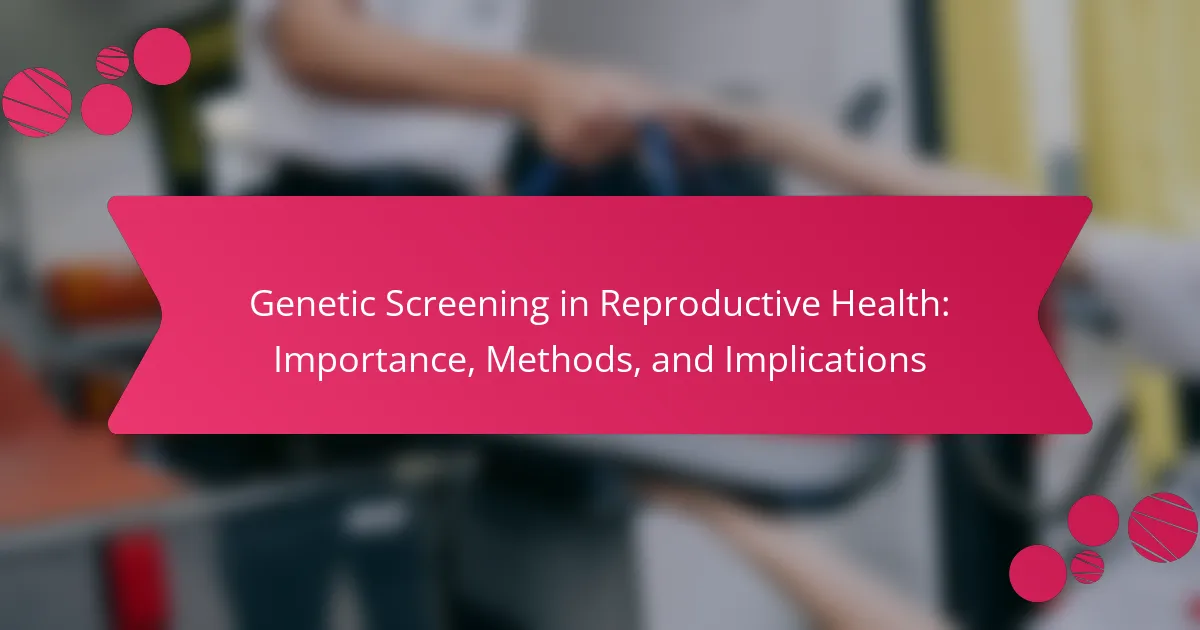Genetic screening plays a vital role in reproductive health by identifying potential genetic disorders in parents and embryos. This article explores the methods used, including carrier screening and non-invasive prenatal testing, and discusses the ethical implications surrounding privacy and informed consent. Additionally, it examines regional differences in genetic screening practices and highlights unique factors influencing decision-making in this area. Understanding these aspects is essential for informed reproductive choices.
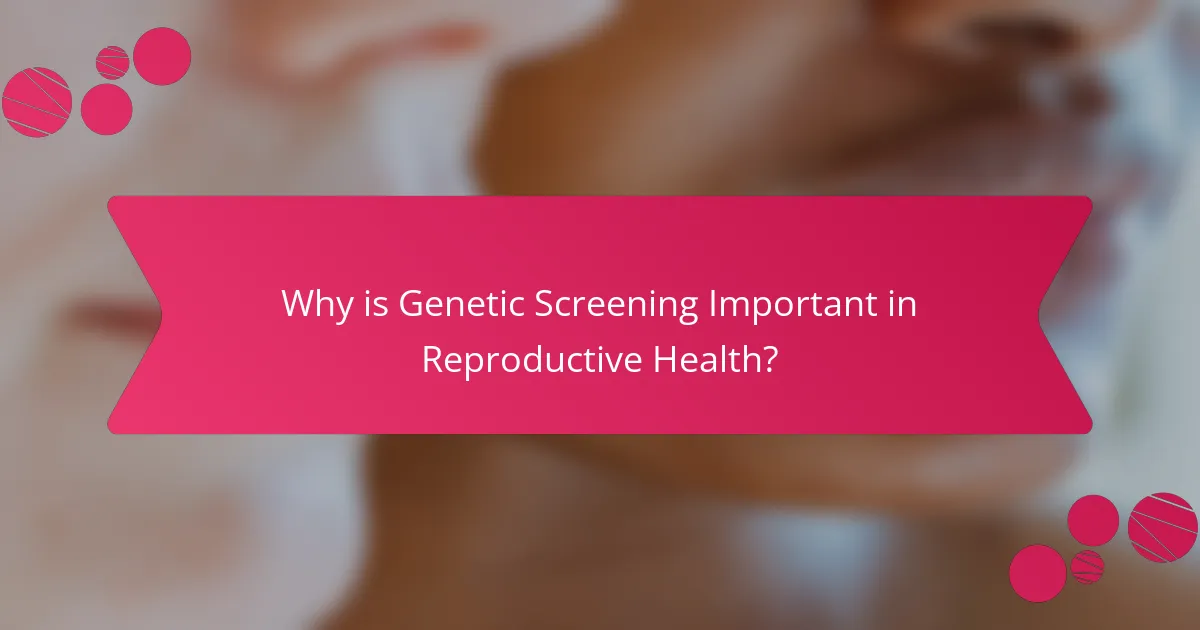
Why is Genetic Screening Important in Reproductive Health?
Genetic screening is crucial in reproductive health as it identifies potential genetic disorders in parents and embryos. This proactive approach enhances informed decision-making regarding family planning. By detecting conditions like cystic fibrosis or Down syndrome, couples can prepare for challenges or consider alternative options. Moreover, genetic screening can reduce the incidence of hereditary diseases, improving overall public health outcomes.
What are the primary benefits of genetic screening for prospective parents?
Genetic screening for prospective parents offers significant benefits, including early detection of genetic disorders, informed reproductive choices, and reduced risk of inherited conditions. It enables couples to understand carrier status for conditions like cystic fibrosis or sickle cell anaemia, guiding decisions on family planning. Additionally, genetic screening can enhance prenatal care by identifying potential health issues, allowing for timely interventions. This proactive approach ultimately leads to healthier outcomes for both parents and children.
How does genetic screening impact prenatal care and outcomes?
Genetic screening significantly enhances prenatal care and outcomes by identifying potential genetic disorders early. This proactive approach allows for informed decision-making and tailored interventions.
Screening methods include non-invasive prenatal testing (NIPT), chorionic villus sampling (CVS), and amniocentesis. Each method varies in risk and accuracy, impacting the management of pregnancy. For example, NIPT is highly accurate and carries no risk of miscarriage, while CVS and amniocentesis involve some risk but provide definitive results.
Early detection of conditions like Down syndrome or cystic fibrosis can lead to better health management strategies. Parents can prepare emotionally and mentally, considering options such as further testing, specialised care, or support resources.
The implications of genetic screening extend to public health, potentially reducing the incidence of genetic disorders and associated healthcare costs. This proactive approach fosters healthier pregnancies and outcomes for families.
What role does genetic screening play in preventing hereditary diseases?
Genetic screening plays a crucial role in preventing hereditary diseases by identifying genetic predispositions before conception. This proactive approach allows prospective parents to make informed decisions regarding family planning and potential interventions.
Screening methods include carrier testing, prenatal testing, and preimplantation genetic diagnosis (PGD). Carrier testing assesses if individuals carry genes for specific hereditary conditions. Prenatal testing evaluates the fetus for genetic disorders, while PGD screens embryos during in vitro fertilisation for genetic abnormalities.
The implications of genetic screening are significant. Early detection can lead to preventive measures, reducing the incidence of hereditary diseases. Additionally, it empowers individuals with knowledge about their genetic health, enabling informed choices about reproduction and lifestyle.
Ultimately, genetic screening enhances reproductive health by minimising risks associated with hereditary diseases, thereby promoting healthier future generations.
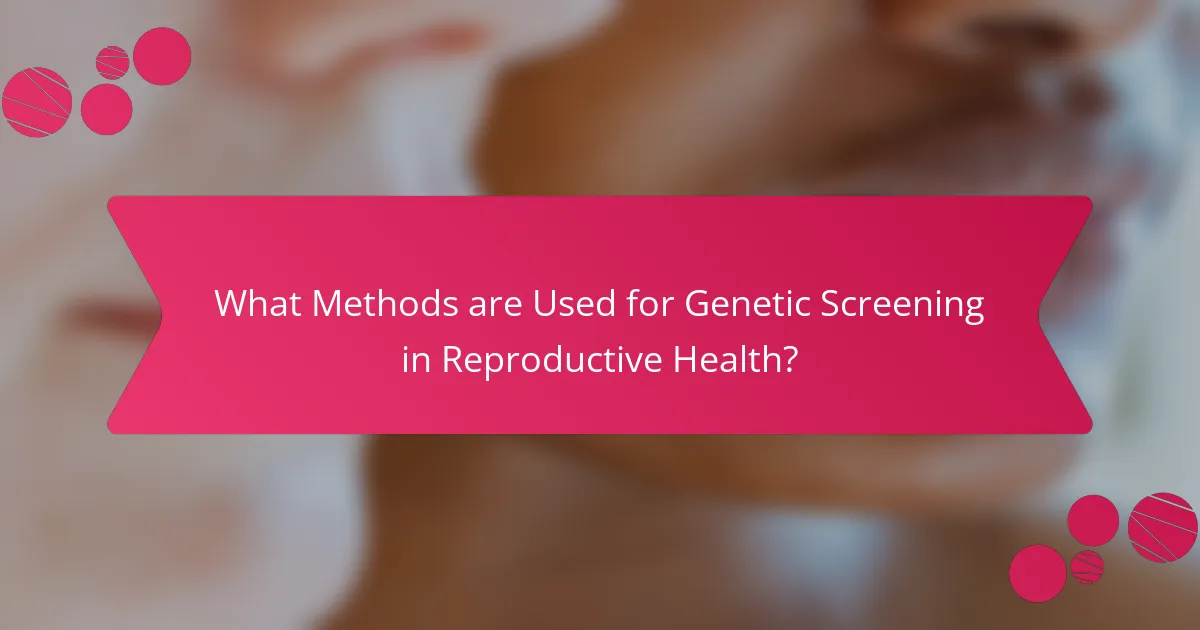
What Methods are Used for Genetic Screening in Reproductive Health?
Genetic screening in reproductive health employs various methods to assess genetic conditions. Common techniques include carrier screening, non-invasive prenatal testing (NIPT), and amniocentesis. Carrier screening identifies individuals at risk of passing genetic disorders to offspring. NIPT analyses fetal DNA in maternal blood to detect chromosomal abnormalities. Amniocentesis involves sampling amniotic fluid to diagnose genetic conditions, offering high accuracy but with associated risks. Each method has unique benefits and implications for reproductive decisions.
Which techniques are commonly employed in genetic screening?
Common techniques in genetic screening include carrier screening, prenatal testing, newborn screening, and preimplantation genetic diagnosis. Each method serves to identify genetic disorders and assess risks in reproductive health. Carrier screening detects gene mutations in individuals, prenatal testing analyses fetal DNA, newborn screening checks for metabolic disorders, and preimplantation genetic diagnosis examines embryos before implantation. These techniques help inform healthcare decisions and improve outcomes for families.
How do non-invasive prenatal testing (NIPT) and invasive methods differ?
Non-invasive prenatal testing (NIPT) uses maternal blood samples to assess fetal genetic conditions, while invasive methods involve procedures like amniocentesis that directly sample amniotic fluid. NIPT is safer with no risk of miscarriage, whereas invasive methods provide definitive results but carry procedural risks. NIPT has a detection rate of over 99% for conditions like Down syndrome, while invasive testing can confirm results with 100% accuracy.
What advancements in technology are shaping genetic screening practices?
Advancements in technology are enhancing genetic screening practices through improved accuracy and accessibility. Innovations like next-generation sequencing (NGS) allow for comprehensive analysis of genetic material, identifying potential genetic disorders more efficiently. Artificial intelligence (AI) is streamlining data interpretation, reducing the time needed for results. Telehealth platforms are making genetic counselling more available, reaching a broader audience. These technologies collectively improve patient outcomes and inform reproductive health decisions.
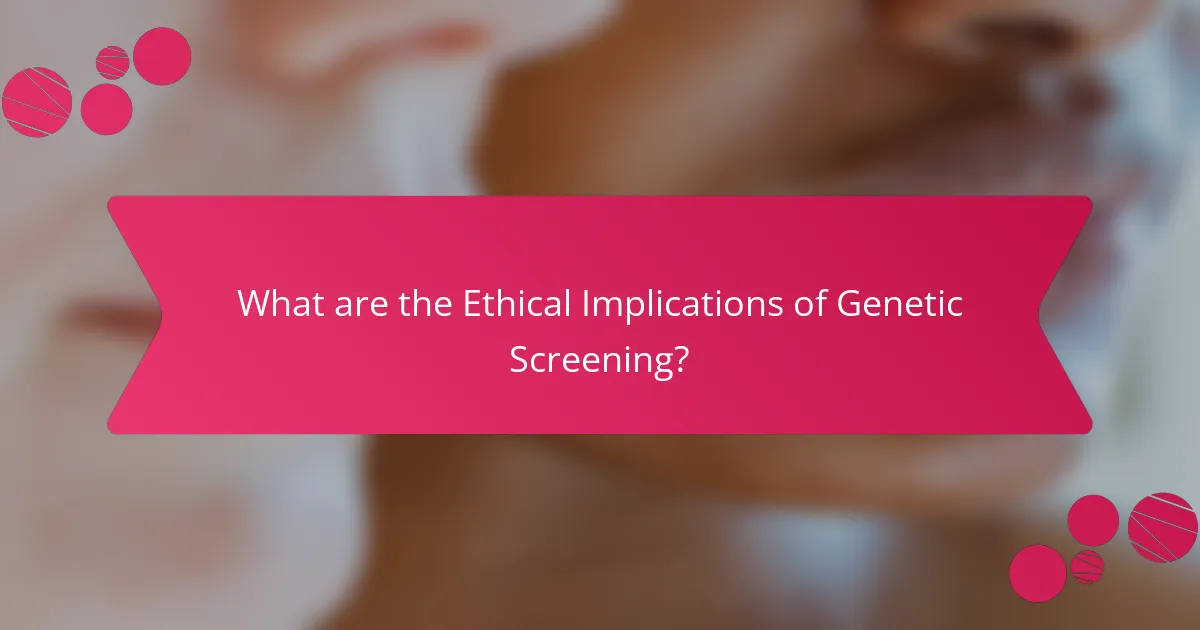
What are the Ethical Implications of Genetic Screening?
Genetic screening raises significant ethical concerns, including privacy, informed consent, and potential discrimination. These implications impact individuals and society, particularly regarding reproductive choices and genetic information usage. Ensuring ethical frameworks guide genetic screening practices is vital to protect rights and promote equitable access.
How do cultural attitudes influence perceptions of genetic screening?
Cultural attitudes significantly shape perceptions of genetic screening by influencing beliefs about health, ethics, and personal choice. For instance, in some cultures, genetic screening is viewed positively as a means to enhance reproductive health and prevent diseases. In contrast, other cultures may perceive it as a violation of natural processes or an ethical dilemma.
Factors such as religious beliefs, societal norms, and historical context play crucial roles in these attitudes. For example, in communities where traditional values dominate, there may be resistance to genetic interventions. Conversely, cultures that prioritise scientific advancement may embrace genetic screening as a vital health strategy.
Additionally, awareness and education about genetic screening impact perceptions. Populations with higher access to information may exhibit more favourable views. As a result, public health initiatives must consider cultural contexts to effectively promote genetic screening and address potential misconceptions.
What are the potential psychological impacts of genetic screening results?
Genetic screening results can lead to significant psychological impacts, including anxiety, guilt, and altered family dynamics. Individuals may experience heightened stress due to uncertainty about potential health issues. Additionally, results can affect relationships, as partners may react differently to findings. Support systems, such as counselling, are crucial to mitigate these psychological effects. Understanding the emotional implications is key to navigating the complexities of genetic screening in reproductive health.
How do privacy concerns affect genetic screening practices?
Privacy concerns significantly impact genetic screening practices by influencing patient willingness to participate and data sharing protocols. Many individuals fear misuse of genetic information, leading to potential discrimination or breaches of confidentiality. As a result, healthcare providers often implement stringent data protection measures and informed consent processes to address these concerns. Furthermore, regulations like the Genetic Information Nondiscrimination Act (GINA) aim to safeguard individuals from discrimination based on genetic data, shaping how genetic screening is conducted in reproductive health.
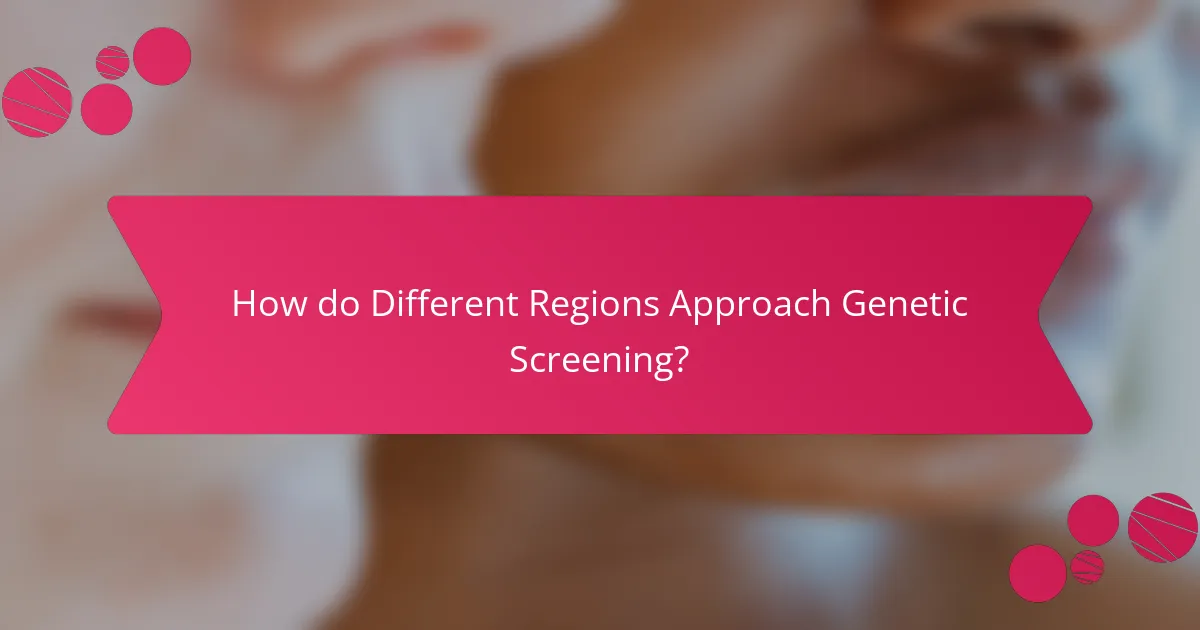
How do Different Regions Approach Genetic Screening?
Different regions approach genetic screening with varying methods and regulations. In North America, a focus on comprehensive carrier screening is common, often covering numerous genetic conditions. Europe emphasises ethical considerations, leading to diverse screening practices across countries. In Asia, rapid advancements in technology have facilitated broader access to genetic testing, though cultural factors influence acceptance. Each region balances public health benefits with ethical concerns and accessibility, shaping its unique genetic screening landscape.
What variations exist in genetic screening regulations across countries?
Genetic screening regulations vary significantly across countries, influenced by ethical, cultural, and legal frameworks. For instance, the United States emphasises patient autonomy, allowing diverse screening options, while countries like Germany enforce stricter regulations to protect genetic privacy. Other nations, such as the UK, have established comprehensive guidelines that balance innovation with ethical considerations. These differences impact accessibility and the scope of genetic testing available to individuals.
Which regional health organizations lead in genetic screening initiatives?
The leading regional health organizations in genetic screening initiatives include the Centers for Disease Control and Prevention (CDC), the World Health Organization (WHO), and the European Society of Human Genetics (ESHG). These organizations promote genetic screening to enhance reproductive health outcomes. They provide guidelines, research, and resources to support screening programs. Their initiatives focus on early detection of genetic disorders, improving patient care, and informing public health policies.
How do societal norms shape the acceptance of genetic screening globally?
Societal norms significantly influence the acceptance of genetic screening globally. Cultural beliefs, religious values, and ethical considerations shape public perception and policy regarding genetic testing. In many societies, acceptance hinges on understanding the benefits of genetic screening, such as disease prevention and informed reproductive choices.
In regions where individual autonomy is prioritised, genetic screening is more widely embraced. Conversely, in communities with strong adherence to traditional values, there may be resistance due to fears of eugenics or stigmatization of genetic conditions. Public education campaigns can enhance acceptance by addressing misconceptions and highlighting the positive implications for family health.
Additionally, the legal framework surrounding genetic screening varies globally, reflecting local societal norms. Countries with supportive policies tend to see higher rates of screening adoption. As a result, societal attitudes play a critical role in determining how genetic screening is integrated into reproductive health practices worldwide.
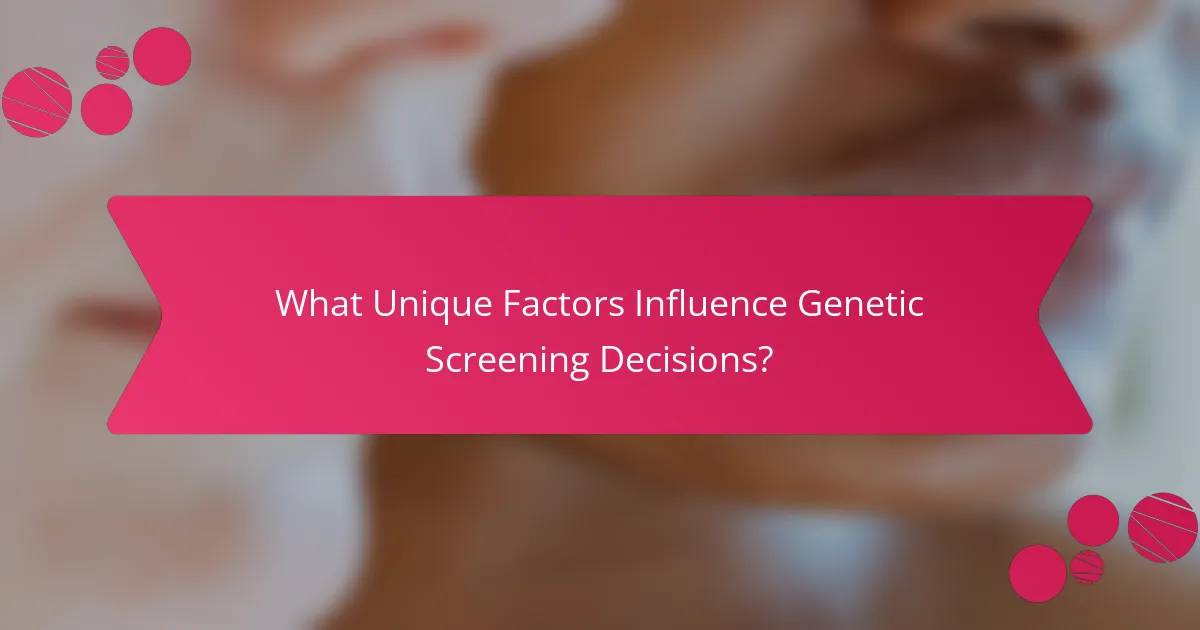
What Unique Factors Influence Genetic Screening Decisions?
Unique factors influencing genetic screening decisions include personal values, cultural beliefs, and medical history. These elements shape individuals’ perspectives on risks and benefits associated with genetic information. For instance, some may prioritise the health implications for future children, while others may consider ethical concerns. Additionally, access to genetic counselling and education plays a critical role in decision-making. Financial considerations, such as insurance coverage for tests, also significantly impact choices. Thus, understanding these unique factors is essential for tailoring genetic screening approaches in reproductive health.
How do personal health histories affect genetic screening choices?
Personal health histories significantly influence genetic screening choices by identifying risks and tailoring assessments. A comprehensive health history reveals hereditary conditions, guiding decisions on specific tests. For example, a family history of breast cancer may prompt BRCA gene testing. Additionally, personal health factors like age and pre-existing conditions can affect the choice of screening methods. Understanding these aspects enhances the effectiveness of genetic screening in reproductive health.
What role do family dynamics play in the decision-making process?
Family dynamics significantly influence decision-making in genetic screening for reproductive health. The values, beliefs, and communication patterns within a family shape how individuals perceive genetic risks and benefits. For example, families that prioritise open discussions may better navigate the complexities of genetic information, leading to more informed choices. Additionally, cultural factors can affect attitudes toward screening, impacting whether families pursue testing. Understanding these dynamics is crucial for healthcare providers to support families effectively in making reproductive health decisions.
How do socioeconomic factors impact access to genetic screening?
Socioeconomic factors significantly impact access to genetic screening. Individuals from higher socioeconomic backgrounds generally have better access to healthcare services, including genetic testing.
Factors such as income level, education, and insurance coverage influence the availability and affordability of genetic screening. For example, people with higher education levels are more likely to understand the benefits of genetic screening and seek it out.
Additionally, geographic location plays a role; urban areas often have more healthcare resources compared to rural regions. As a result, socioeconomic disparities can lead to unequal access, affecting early detection and preventive measures in reproductive health.
Addressing these disparities is essential for equitable healthcare access and improving overall health outcomes.
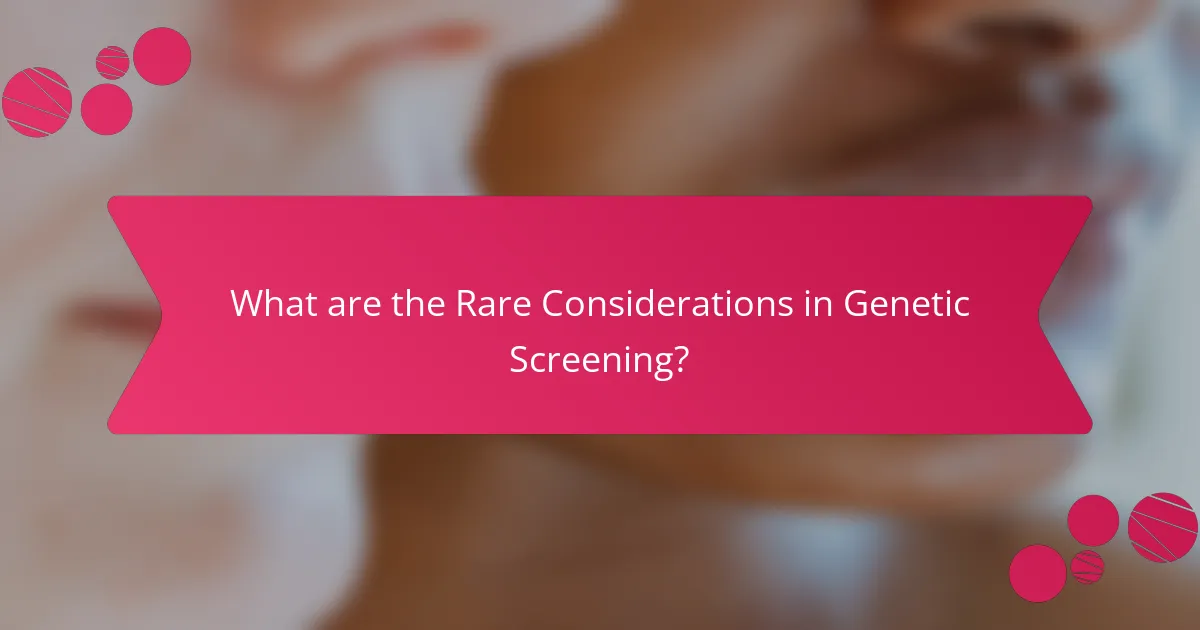
What are the Rare Considerations in Genetic Screening?
Rare considerations in genetic screening include ethical dilemmas, psychological impacts, and potential discrimination. These factors can influence decision-making and outcomes for individuals and families. Genetic privacy concerns arise, as sensitive information may be misused. Additionally, access to screening can vary, leading to disparities in reproductive health. Understanding these rare attributes is vital for informed choices in genetic screening.
What uncommon genetic conditions can be identified through screening?
Genetic screening can identify several uncommon genetic conditions, including cystic fibrosis, Tay-Sachs disease, and spinal muscular atrophy. These conditions often have significant health implications and can be detected through carrier screening methods. Screening allows for informed reproductive choices and early intervention strategies.
How do rare genetic variants affect reproductive health decisions?
Rare genetic variants can significantly influence reproductive health decisions by identifying potential risks for inherited conditions. Couples may choose genetic screening to assess these variants, informing choices about family planning and prenatal care. Understanding these variants helps in making informed decisions, potentially leading to healthier outcomes for offspring. Genetic counselling can provide insights into the implications of specific rare variants, guiding individuals through their reproductive options.
What are the implications of discovering incidental findings during screening?
Discovering incidental findings during genetic screening can lead to significant implications for reproductive health decisions. These findings may reveal genetic conditions that were not the original focus of the screening. As a result, individuals may face emotional distress, ethical dilemmas, and complex choices regarding family planning. Furthermore, healthcare providers must navigate the challenges of communicating these results and providing appropriate counselling. The potential for unexpected information highlights the importance of informed consent and thorough pre-screening discussions.

What Best Practices Should Be Followed in Genetic Screening?
Best practices in genetic screening involve informed consent, comprehensive counselling, and adherence to clinical guidelines. Ensuring that patients understand the implications of the results is crucial. Use validated testing methods to enhance accuracy and reliability. Regularly update protocols based on emerging research and ethical standards.
How can prospective parents prepare for genetic screening consultations?
Prospective parents can prepare for genetic screening consultations by gathering family medical histories and understanding genetic conditions. They should also prepare questions about the screening process, potential outcomes, and implications for reproductive choices. Familiarising themselves with different screening methods, such as carrier screening or prenatal testing, can enhance their discussions with healthcare providers. Lastly, considering emotional support resources is crucial, as genetic screening can evoke strong feelings regarding family planning.
What common misconceptions should be addressed regarding genetic screening?
Common misconceptions about genetic screening include the belief that it guarantees health outcomes, that it is only for high-risk individuals, and that it is always invasive. These misunderstandings can lead to missed opportunities for proactive health management. Genetic screening is a valuable tool for anyone considering reproduction, as it can identify carrier status for various genetic conditions. Additionally, many methods are non-invasive, such as blood tests, which can increase accessibility and comfort. Addressing these misconceptions is essential for informed decision-making in reproductive health.
How can healthcare providers improve communication about genetic screening results?
Healthcare providers can improve communication about genetic screening results by adopting clear, empathetic approaches. They should prioritise patient education, ensuring that individuals understand their results and implications. Utilising visual aids can enhance comprehension, while offering follow-up consultations allows for addressing questions. Regular training for providers on effective communication techniques is essential. Lastly, fostering an open environment encourages patients to discuss their concerns freely.
